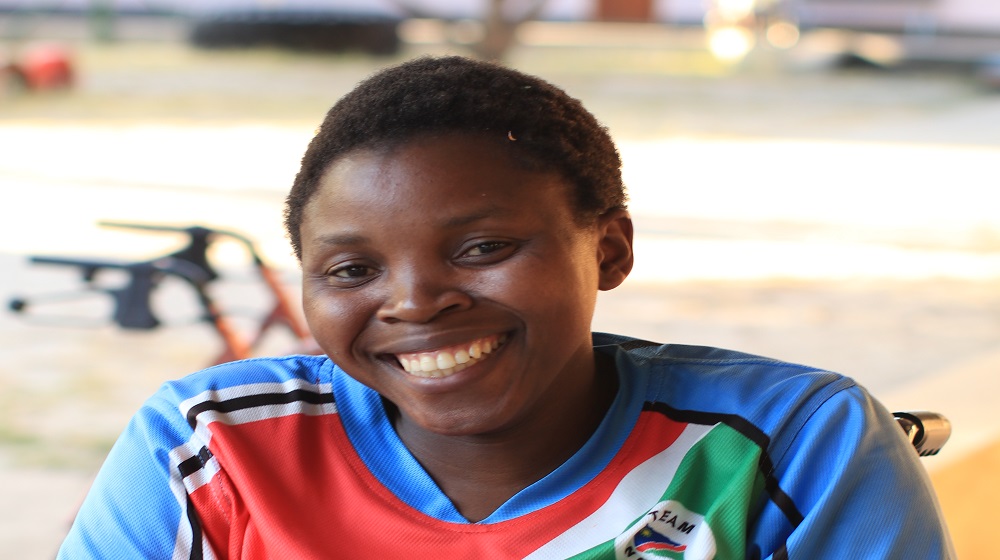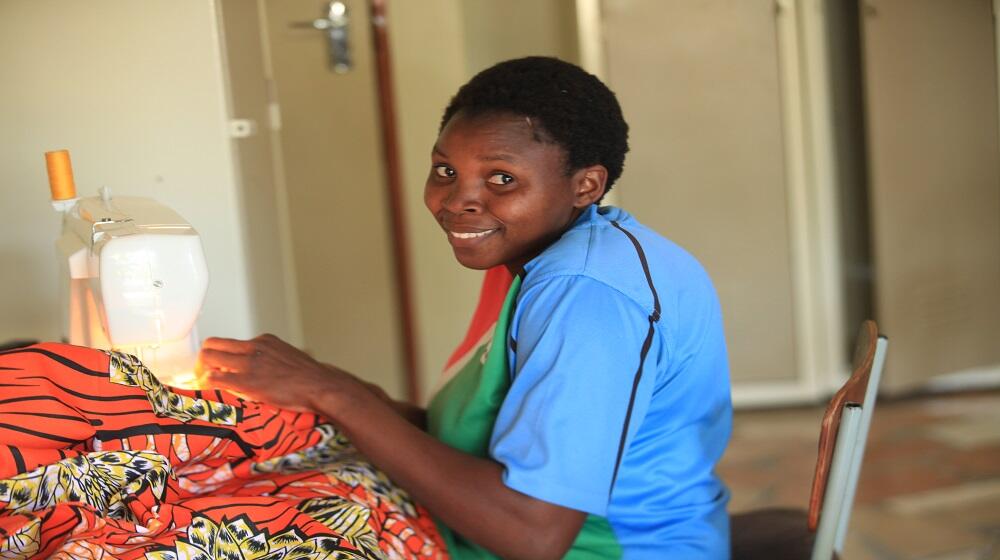
Before this condition got me I was free. I was able to run around with my friends. At that time my favourite thing was playing soccer.
KATIMA MULILO, Namibia — Mushongo Anna Kamuti is the beneficiary of a professional sewing machine and materials from the Leaving No One Behind Project funded by the Government of Japan on 28 July 2022. But it has been a long road for the girl who loved to play soccer.
When Kamuti arrived at Cheshire home in Katima Mulilo, Zambezi region 16 years ago she was a little girl just coming to terms with her disability. Kamuti was diagnosed with spinal tuberculosis (TB), also known as Pott disease, the most dangerous form of TB that causes spinal deformity and paralysis.
“Before this condition got me I was free. I was able to run around with my friends. At that time my favourite thing was playing soccer,” said Kamuti.
Today she is a young woman who is using her exceptional talent for making clothes to generate income and work for herself.
“When Kamuti came, she was so shy and confused because she had just learned of her condition,” said Sister Faustina Haushiku, the Matron of Cheshire Home.
Journey to self-reliance
Kamuti went to Nyangana hospital in the Kavango region where she was identified by Sister Margereth Dziadkowiec who was the Matron of Cheshire home. Sister Dziadkowiec, who was also providing physiotherapy, noticed that despite having TB, Kamuti could talk very well and use a wheelchair. She was then brought to Cheshire Home in Katima Mulilo to attend school. She failed Grade 10 and was unable to improve her marks with the Namibian College of Open Learning (NAMCOL). She went back to her village in Kavango region.
Sister Haushiku, convinced that her potential for art can integrate her into society, brought her back to help clean the guest rooms.
“If these accommodation facilities have to generate income for children with disabilities then I prefer a girl with disability to do the work,” said Sister Haushiku. This was the beginning of Kamuti’s journey to self-reliance.
The second step came when she received sewing training from late Sister Francis Simangowa. This was a breakthrough and she went to tailoring like a fish to water. She even spent considerable time under the tutelage of Mr. Mundia Martin an experienced tailor who was identified to train her. She was truly natural and caught on fast on how to sow trousers, make adjustments, and other important tailoring skills. Sister Francis was surprised at all the things she was able to learn and master in such a short time.
Becoming a stronger version of herself
But it was not only about the skills. The Cheshire Home team worked hard on Kamuti’s confidence by always encouraging her. “We used to say Kamuti you can do it,” said Sister Faustina. “Eventually Kamuti became the Kamuti we know today.”
“The Kamuti we know today is an entrepreneur and seasoned tailor ready to take on the fashion world with her new sewing machine,” she added.
Kamuti was waiting for that opportunity to be empowered and start empowering others. On 3 August 2022, a week after she successfully delivered a consignment of Shitenges, Kamuti bought a double bed.
“It means a lot that after receiving the first payment she decided to buy something that she has wanted for a long time,” said Ms.Sheila Roseau, UNFPA Namibia Country Representative.
“This is in line with the Leaving No One Behind Project’s objective of supporting those who are farthest left behind. There are so many others who can not only support themselves but can also contribute positively to their communities,” she stated.
About the Leaving No One Behind Project
The Leaving No One Behind Project is funded by Government of Japan to contribute to gender-based violence (GBV) prevention and response interventions in the context of COVID-19. The project seeks to improve the support to adolescent women and girls, particularly pregnant and lactating women, in and out-of-school adolescents and youth, people with disability, men and boys, Angolan refugees affected by worsening existing inequalities due to COVID-19.


